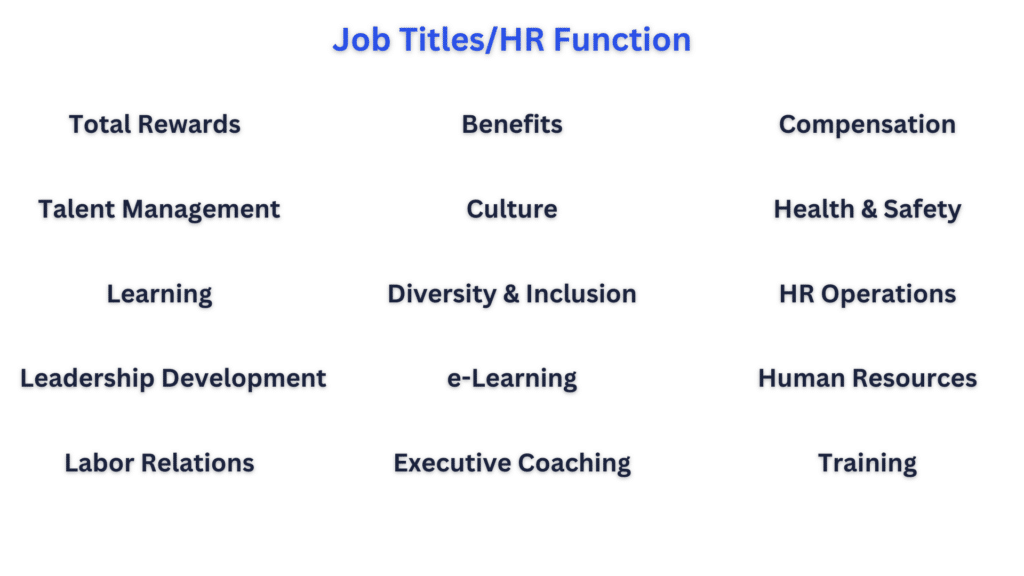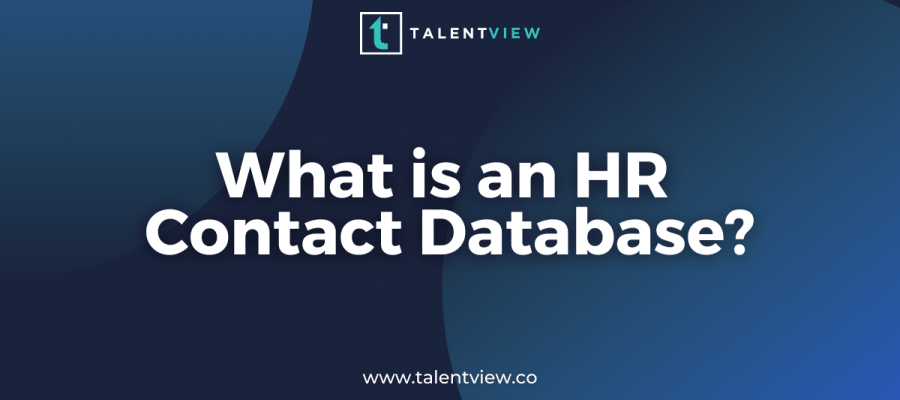HR contact databases are primarily used for hosting employee personal information and business records. An HR contact database can have professionals in the areas of recruiting, performance, training, learning, and benefits in the database.
The best databases have verified and up-to-date contact information, including the prospect phone, email, LinkedIn profile, and most-recent job function.

Key Features
Contact databases are crucial to the success of sales and marketing campaigns. Whether you’re prospecting 10 accounts or 10,000 accounts, your contact data should have a handful of key components to maximize your results.
Custom Search Criteria in Your HR Contact Database
To save time and improve accuracy, your contact database should have custom search criteria functionality. This allows you to filter down to the ideal customer you’re looking for in the database. Here’s some of the key search filters your database should include:

Verified HR Contact Data
Verified contact data will save you time and provide the most accurate results in your sales and marketing prospecting efforts. Your contact database should have the most up-to-date job titles, current company, and basic information.
Relevant HR Contact Database Features
The most important feature of a database is the core data. Having the correct contacts, companies, industries, etc. should be at the top of the list. Once you’ve solidified the accuracy of the basic data, additional relevant features are key bonuses to any contact database. Here’s a few key features that can be highly valuable for organization:
Intent data in Your HR Contact Database
Intent data is a great tool for marketing and sales teams to utilize when developing campaigns and sequences. In short, this data indicates prospects’ level of interest in a particular product or service online. In other words, think of intent data warm leads for your product or service that you haven’t even contacted yet– or know for that matter!
This data is used by marketing teams to target in their marketing campaigns. Whether it be a calling campaign, email blast, or mailers– intent data can act like a compass for marketing teams, if used correctly. Sales teams will also use intent data, but usually for calling campaigns and targeting specific accounts.
Integrations For Your HR Contact Database
This is important for your HR contact database are important for a few reasons:
- Fluidity in your prospecting and campaign design
- Ease of communication between different departments in your organization
- Saves time and tracks results
Whether from your organizations CRM, email provider, phone dialer, etc.– integrations play an important role when choosing an HR contact database.
Suppression lists/company match features
Relevant features are also subjective to what’s most important for you and your team. Most marketing teams utilize intent data more than sales teams, as an example. Connect with the end-users in your organization to feel confident in your decision.
Common HR Professional Pain Points
If you’re selling a B2B solution, you’re solving a problem for your prospects. Furthermore, it’s important to understand the pain points of your target market in order to produce the best results. Here are some of the main pain points that HR professionals face:
Employee Experience
One of the main functions of an HR professional is attracting talented employees to the organization. Recently, HR departments are showing more interest in incentives and employee retention solutions more than ever.
Benefits like professional development, wellness memberships, hybrid work, and other employee benefits programs are all solutions that target employee experience and benefits that retain great employees.
Learning and Development
With uncertainty in nearly every market, many employees are seeking a career, not just a job. In short, a place they can see themselves growing and advancing in from a career standpoint.
The HR department is responsible for sourcing the training/learning and development programs that will set employees up for current and future success. However, there are a large amount of learning and training companies in the marketplace. Providing a solution that fits a companies specific needs can drastically enhance a company’s overall culture and retention– a huge pain point for HR professionals.
Attracting Great Employees
As we mentioned above, one of the main jobs of an HR professional is attracting– and retaining– great talent. HR professionals are constantly seeking solutions to attract the best talent in the market.
Because the cost of a bad hire is so significant, HR professionals are generally open to solutions that solve this particular problem.
Connect with Decision Makers Through an HR Contact Database
Connecting with decision makers increases your chances of closing a sales opportunity. Decision makers qualify as anyone who has the budget to purchase your product or service or ultimate say in business decisions. In most cases, c-suite executives and vice presidents within an organization have the final say in purchases or partnerships.
Before you can successfully connect with decision makers, it’s important to first understand:
- Who the decision makers are
- What they ultimately do
- Which problems you’re solving for them with your product or service
Remember, it’s pointless to put time and resources toward prospects that don’t have the budget or the need for your product or service. This is where having the right HR contact database comes in to play.
HR Personas
You’ll often have a number of different personas to connect with when contacting HR leaders. Some may have more specialized responsibilities that you’d only see in larger companies, where some may be more general responsibilities you’ll see in all types of companies, big or small.
Specialist HR Contacts in an HR Contact Database
- Compliance
- Employee Benefits
- L&D
- Health and Wellness
- Recruiting
- Workplace Safety
- Training and Development
- DE&I
General HR Contacts in an HR Contact Database
- Human Resources
- Payroll
- Leadership
- HR Operations
In most cases, general HR contacts will cover a little bit of everything mentioned in both categories above. As we said before, larger companies will have more specialist HR positions, simply because they have the resources to support those positions. Whereas smaller companies will have general HR contacts that will cover a broad scope of HR departments. Keep this in mind as you prospect the contacts on your HR contact database.

HR in Large Organizations
Because bigger organizations have the resources to house specific HR departments, selling niche products and services to these larger companies can be a great avenue for B2B companies that sell to HR.
These HR professionals may be required to have the sign-off of the HR director. However, the end-user in these particular cases can get your proverbial “foot in the door” with the decision makers at the company.
Here are a few categories that specialist HR contacts would cover for large companies:
-
Compliance
- With so many moving pieces in a large company, ensuring the company’s compliance with their staff is incredibly important. Specifically in the U.S., there are many laws and regulations in regards to compliance– so, if you’re selling a compliance solution, you can cast a fairly large net when connecting with HR professionals.
-
Recruitment
- A large number of HR teams work with recruiting consultants and have budgets that can handle consulting fees once a new team member is hired. Again, many large companies employ staff through a recruiter instead of employing them directly, so there is an opening for those in the recruitment consulting and recruiting software niche.
-
Career Development
- Learning, training, e-Learning platforms, and more provide opportunities for career development. In most cases, you’ll only see career development solutions in larger companies with the budget to offer such benefits.
-
HR Software
- Software covers a wide range of different solutions for companies, large and small. Remember, every solution will offer a different result for companies and with the uprise in remote work, software solutions for companies of all sizes has become a top priority.
HR in Small Organizations
Smaller organizations with fewer employees will have a more broad approach to HR. For instance, there may be one to two HR professionals in a smaller organization that have responsibilities in different areas.
As an example, one HR professional in a smaller organization may handle all employee benefits, compensation, and total rewards– while the other HR professional may cover recruiting, compliance, and other HR functions within the organization.
Keep in mind, smaller companies have a smaller budget as well, which means they’re likely only looking for a handful of solutions. Here are a few areas of HR that smaller organizations focus on:
-
Recruitment
- Within smaller organizations, cost will always be a key factor. For that reason, recruiting consultants– as an example– won’t be a great fit for a smaller organization. Within smaller organizations, Applicant Tracking Systems would be a great platform for companies to minimize costs associated with recruiting.
-
Employee Retention
- Small organizations may not spend money on niche benefits or career development, but they are much more likely to spend money on areas that help with employee retention. For instance, business solutions in the areas of training, safety, health and wellness, financial wellness, etc. are areas that small organizations will commonly invest their money into.
-
Administration Solutions
- Cutting cost and removing time-wasters are two attractive topics for small organizations. Furthermore, increased compliance and reduced employee turnover act as cost savings benefits for small companies.
What’s in the TalentView HR Contact Database?
Our HR contact database contains the following:
- 350,000 HR contacts in North America
- Validated contact attributes
- Phone– direct, mobile, and office
- LinkedIn profile
- Job function
- Updated nightly
- No credit limits– prospect as much as you want
- Intent data is included for free– we track over 100 intent categories
- Search by company, contact, or intent
For a more in depth look at how to prospect and connect with these decision makers, click How to Book 10+ Meetings with TalentView.
